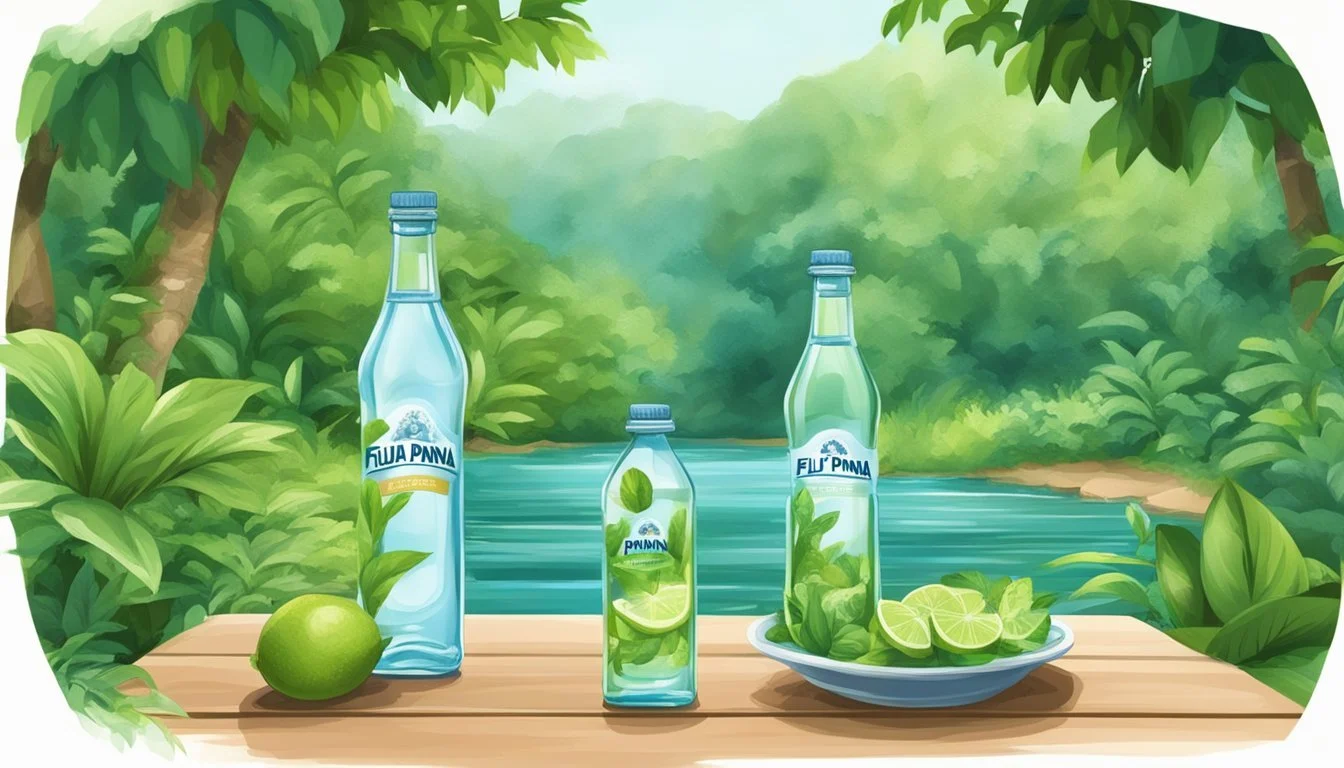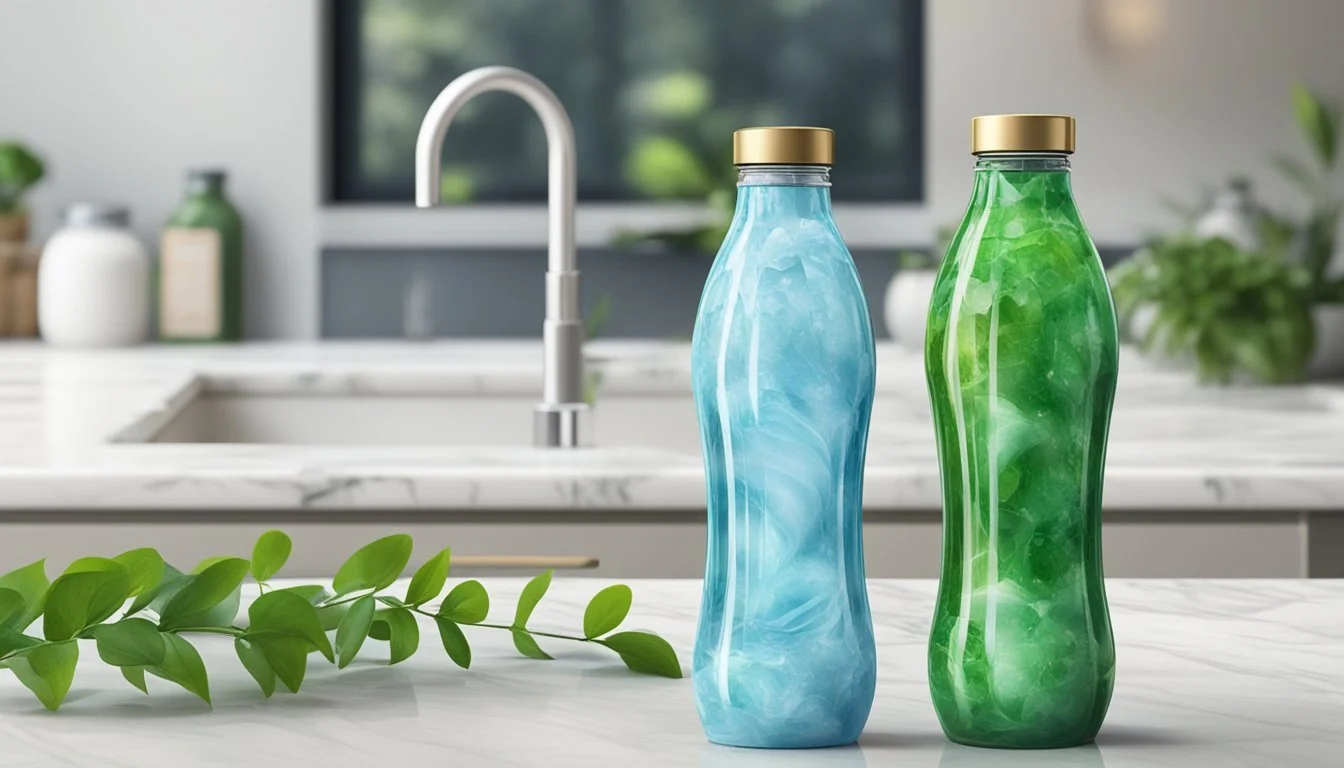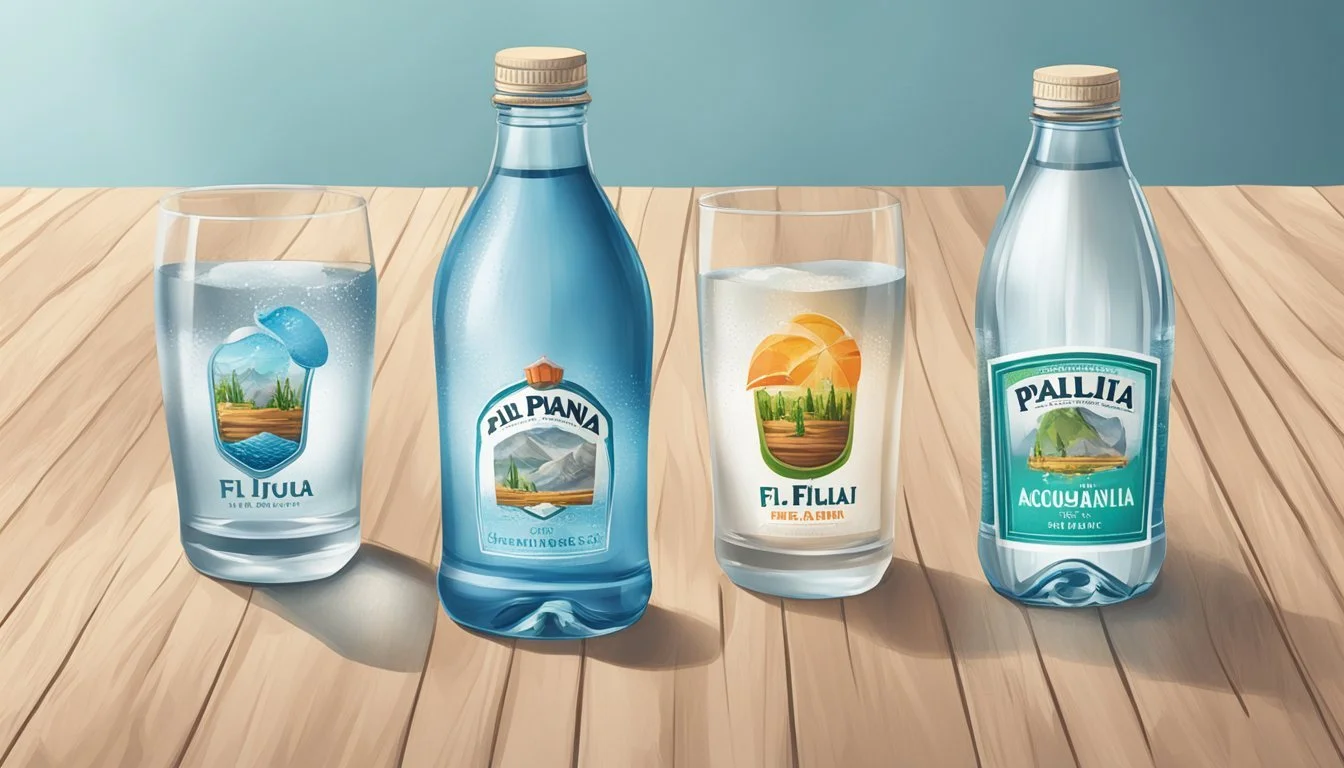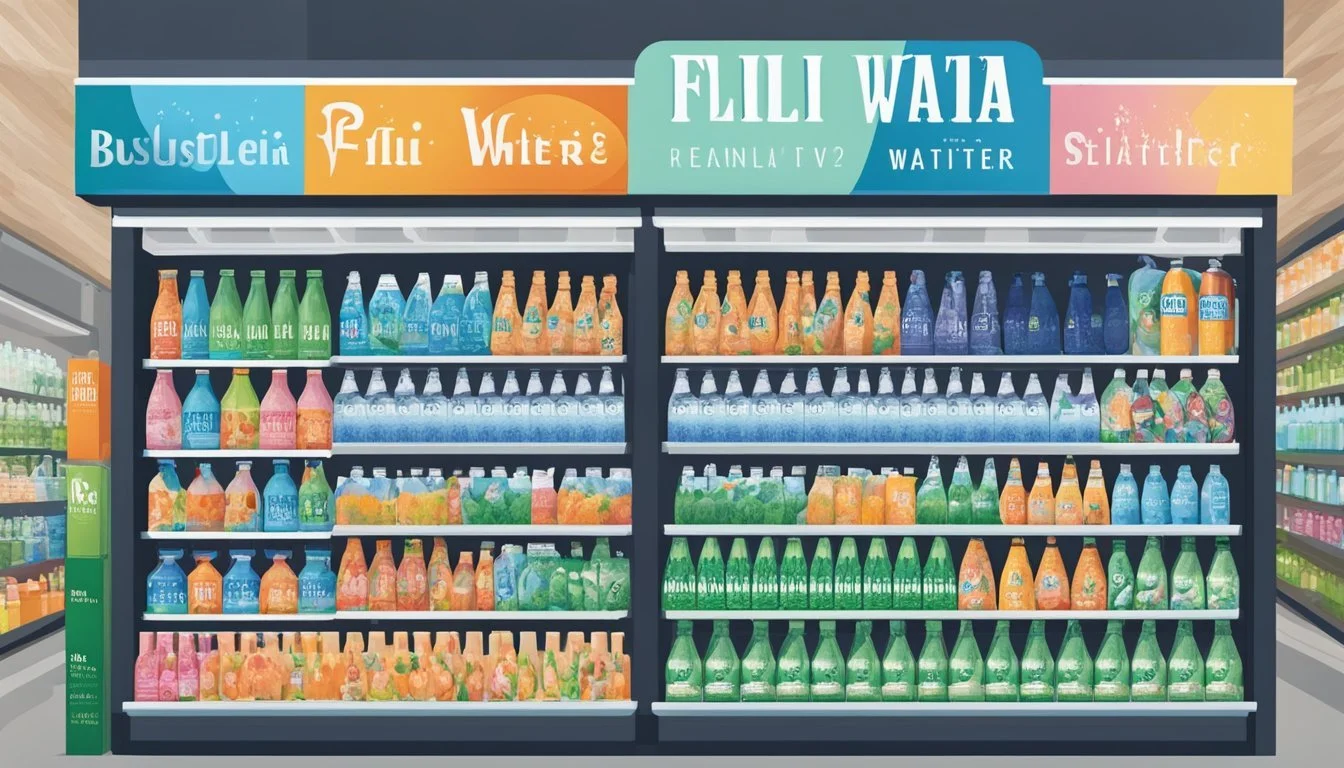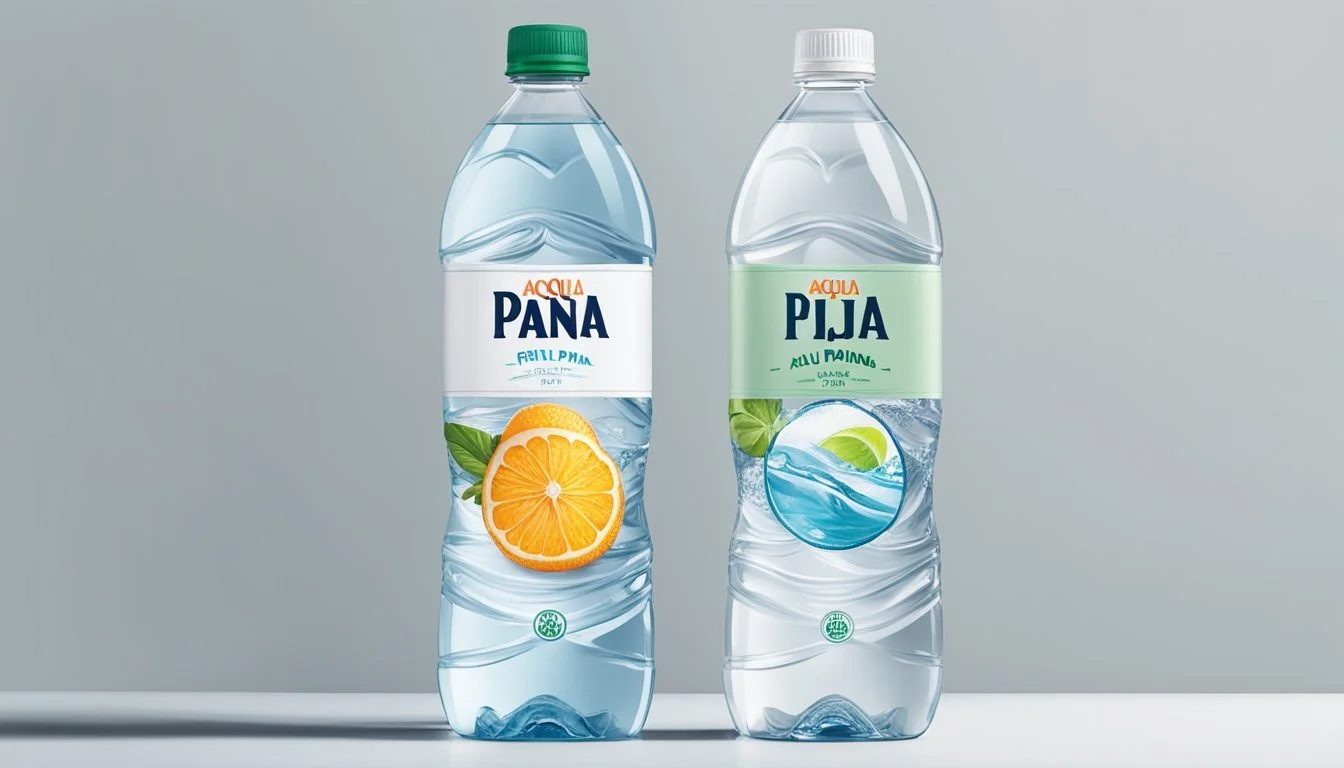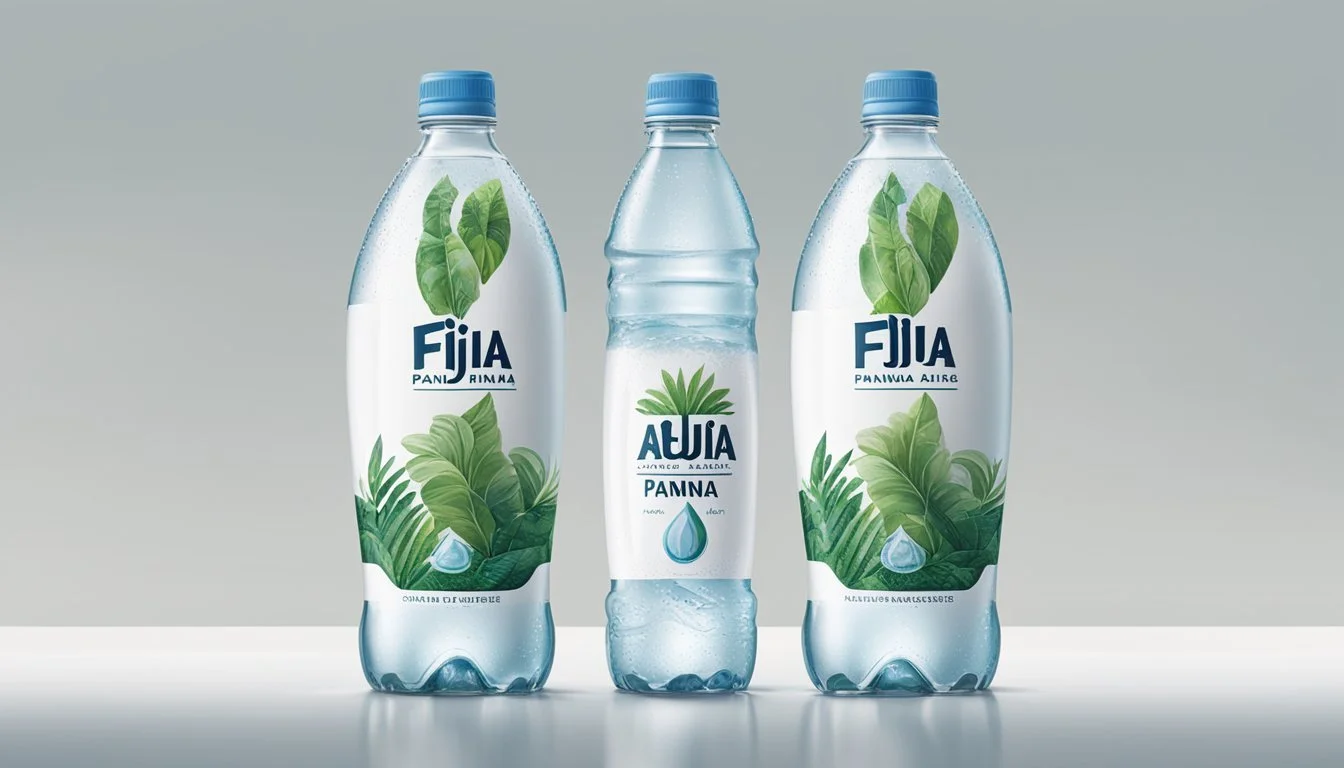Acqua Panna vs. Fiji
A Comprehensive Comparison of Bottled Water Brands
Bottled water has become a staple in the consumption habits of millions worldwide, with various brands vying for supremacy in the market. Among these, Acqua Panna and Fiji Water have emerged as notable contenders, each with its distinctive characteristics. Acqua Panna, hailing from Tuscany, Italy, is renowned for its naturally occurring minerals and a smooth taste. This natural spring water is often celebrated for its purity and is bottled at the source without any additional treatment.
Fiji Water, on the other hand, originates from an artesian aquifer in the remote Fiji Islands. It is filtered naturally through volcanic rock, which lends it a unique mineral profile and contributes to its soft mouthfeel. This water brand emphasizes its untouched journey from cloud to bottle, assuring consumers of its purity. As consumers prioritize health, sustainability, and taste, the debate between Acqua Panna and Fiji Water continues to evolve, with each brand offering a different appeal to hydration seekers around the globe.
History and Origin
The distinctive backgrounds of Acqua Panna and Fiji Water are rooted in their unique geographic origins and historical developments. As two prominent players in the premium bottled water market, their histories reflect a deep connection to their respective natural sources.
Acqua Panna's Tuscan Legacy
Acqua Panna takes its name from the Panna estate in Tuscany, Italy, where its source was first discovered. The water originates in the Apennine Mountains, filtering through limestone and sandstone to the surface at the Panna spring. Acqua Panna's ties to Tuscany date back to the Renaissance period, making it a water with a historical pedigree recognized for its natural purity. Its legacy is built upon centuries of Italian history, and it is often associated with the region's gourmet heritage.
Fiji Water's Pacific Roots
In contrast, Fiji Water emerges from a completely different part of the world, the remote Pacific island of Viti Levu in Fiji. The source of Fiji Water is an artesian aquifer located deep within the earth on the edge of a rainforest, where it is naturally filtered by volcanic rock. This natural filtration imbues it with minerals and electrolytes. Established in the 1990s, Fiji Water has a much younger history than Acqua Panna, yet it quickly gained a reputation for its exotic origin and clean, soft taste. The brand emphasizes its commitment to preserving the natural environment of Fiji, underlining the unspoiled and pure conditions where the water is sourced.
Source and Production
Selecting bottled water often comes down to the source and production methods used by the brand. The source can affect taste and purity, while production sheds light on the sustainability and quality control efforts of the brand.
Acqua Panna's Spring Source
Acqua Panna takes its name and water from a natural spring located in Tuscany, Italy. The spring lies at the foothills of the Apennines, lending the water its renowned softness and balanced mineral composition. The journey of the water begins with rainfall that travels through the underground aquifers for a period of 14 years before being tapped, ensuring natural filtration and the acquisition of minerals.
Fiji's Natural Aquifer
Fiji Water, on the other hand, originates from a sustainable aquifer in the remote Yaqara Valley of Viti Levu, one of Fiji’s two major islands. Here, the water filters through ancient volcanic rock, which naturally enriches it with minerals and electrolytes. The source is isolated and protected from external elements by the dense forest and the Mauna Loa Volcano, contributing to its purity.
Taste and Quality Assessment
When comparing Acqua Panna and Fiji bottled waters, discerning consumers often focus on taste and quality. These two aspects are critical in determining which brand may be superior for personal preference.
Flavor Profile Comparison
Acqua Panna, sourced from the hills of Tuscany, is known for its smooth and light taste with a neutral pH level that adds to its crispness. It often exhibits subtle mineral notes due to its terroir.
Fiji Water boasts a unique mineral profile, as it is filtered through volcanic rock and gathered from an aquifer in Fiji. Consumers frequently report that Fiji Water carries a soft, smooth taste, attributed to its high silica content which lends a silky mouthfeel.
Purity and Contaminant Levels
Both Acqua Panna and Fiji are dedicated to providing clean water that adheres to stringent quality standards.
Acqua Panna undergoes a careful purification process. The brand prides itself on the natural filtration that its water undergoes during a 14-year journey through the earth before being bottled, which helps to maintain the purity while enriching the water with minerals.
Fiji Water emphasizes its natural filtration through ancient volcanic rock, which not only provides its water with a range of minerals but also ensures that it is free from contaminants. The company conducts regular quality tests to ensure low levels of impurities and adherence to international standards.
Health and Hydration
When choosing between Acqua Panna and Fiji bottled waters, consumers often consider their mineral content and hydration capabilities. These factors are critical in determining the potential health benefits of each brand.
Mineral Content Analysis
Acqua Panna water boasts a unique composition of minerals that includes calcium and magnesium, which are essential for bone health and metabolic functions. It originates from the Italian Alps and is known for its smooth taste and quality mineral blend. The mineral content in Acqua Panna, per liter, is approximately:
Calcium: 32 mg
Magnesium: 6.4 mg
Bicarbonate: 104 mg
Sodium: 6.9 mg
Fiji water, on the other hand, is naturally filtered through volcanic rocks which enrich it with minerals and electrolytes. It has a higher silica concentration, which contributes to its smooth, soft taste. Fiji's mineral content per liter typically includes:
Calcium: 18 mg
Magnesium: 15 mg
Bicarbonate: 152 mg
Silica: 93 mg
Sodium: 18 mg
Hydration and Electrolytes
The primary role of bottled water is to hydrate. Both Acqua Panna and Fiji are effective for hydration due to their content of electrolytes such as calcium, magnesium, and bicarbonate. Electrolytes are crucial for maintaining fluid balance in the body, and their presence in water can enhance hydration by replenishing minerals lost through sweat.
Electrolytes in Acqua Panna: Help maintain the body's pH balance and improve hydration.
Electrolytes in Fiji: Particularly silica, which is not commonly found in high concentrations in bottled water, can support hydration and possibly provide additional health benefits, like supporting joint and skin health.
Both brands offer distinct mineral profiles, but for consumers focused on calcium and bicarbonate, Acqua Panna might be preferable. Those seeking a higher magnesium content and the unique benefits of silica might lean towards Fiji. It is essential for individuals to consider their personal dietary needs and health goals when choosing their bottled water.
Environmental Impact
When evaluating the environmental impact of bottled water brands like Acqua Panna and Fiji, it is crucial to consider their sustainability initiatives and the materials used for their bottles, along with the recycling practices they promote.
Sustainability Efforts
Acqua Panna emphasizes its sustainability by sourcing water from Tuscany and implementing responsible practices within its operations. Its dedication to preserving the environment can be seen in its approach to minimizing carbon emissions and ensuring water source protection.
Fiji Water, on the other hand, has made claims about reducing the carbon footprint across its production and distribution processes. It purports to address the environmental concerns linked to the extraction and shipping of its carbonated water.
Bottle Material and Recycling
Acqua Panna:
Bottle Material: Primarily uses glass bottles, considered a more sustainable option due to their reusability and non-toxic nature.
Recycling: Advocates for and facilitates recycling of their glass bottles, aiming to reduce environmental waste.
Fiji Water:
Bottle Material: Utilizes plastic bottles, with a focus on using materials that are recyclable.
Recycling: Encourages consumers to recycle and is involved in initiatives to improve recycling rates for its plastic bottles.
Market Presence and Brand Perception
Acqua Panna and Fiji water are distinguished entities in the bottled water market, with a significant footprint in retail locations and diverse perceptions among consumers. Their presence in well-known stores such as Walmart and Amazon amplifies their global availability, while their respective brand images resonate differently across consumer bases.
Global Distribution and Availability
Acqua Panna is an Italian brand recognized for its still mineral water sourced from Tuscany. It holds a reputable place in the premium water segment and is available across various continents, reflecting a robust global distribution network. The water is typically found in restaurants and retailers, including mainstream outlets like Amazon and Walmart.
Fiji Water, on the other hand, is known for its artesian water originating from the Fiji Islands. It boasts a widespread distribution that reaches numerous countries. Fiji Water is easily accessible both in brick-and-mortar retailers and online platforms, ensuring its presence is prominent in both physical retail spaces and digital marketplaces.
Consumer Loyalty and Brand Image
Consumer loyalty for Acqua Panna is driven by its association with gourmet dining and its positioning as a natural spring water of choice for those with refined taste. The brand's image is tied to Italian culinary tradition and luxury, which appeals to a target market that values heritage and high-quality products.
Fiji Water differentiates itself with a notable consumer loyalty base, attributed to its unique mineral composition and soft taste. The brand's image is connected with purity and a stylish aesthetic, often advertised as the most favored among U.S. adults, according to a consumer survey. This positive perception contributes to its strong standing among premium bottled water brands.
Both brands command attention in the market and maintain distinctive appeals, tapping into consumers' preferences for quality and brand story.
Product Variety and Packaging
In comparing Acqua Panna and Fiji Water, the range of their offerings and the packaging options provided become distinguishing factors that appeal to various consumer preferences. Each brand presents a different approach to product variety and packaging which may sway buyers based on their individual needs and values.
Range of Offerings
Acqua Panna presents itself as a premium brand of still water, sourced from the hills of Tuscany. The brand is notable for its smooth taste and is often associated with fine dining experiences. Its product line is somewhat limited, focusing on quality over quantity.
Still Water: Primary focus with sizes ranging from 250ml to 1L.
Fiji Water, sourced from an artesian aquifer in Fiji, is predominantly known for its naturally sourced still water. Its exotic origin story and high silica content contribute to its unique soft mouthfeel and smooth taste, which Fiji markets as its signature trait.
Still Water: Available in various sizes, including 330ml, 500ml, 700ml, 1L, and 1.5L.
Packaging Options
Acqua Panna places an emphasis on its glass bottled waters, projecting an image of luxury and sustainability.
Glass Bottles: Ranging from 250ml in restaurants to 750ml for retail.
Fiji Water offers a signature square-shaped bottle that is recognized globally, made from high-grade PET plastic which is recyclable. While plastic is their mainstay, they have also introduced boxed water options for sustainability-conscious consumers.
Plastic Bottles: Available in the entirety of their still water range.
Boxed Water: A newer addition designed to reduce the environmental footprint.
Both brands offer different packaging to cater to various occasions, from personal consumption to large gatherings. Fiji's introduction of boxed water reflects a growing trend in environmental responsibility within the water industry. Acqua Panna remains traditional with its glass bottles, emphasizing purity and quality, which is often preferred in formal dining settings and by those who prioritize the use of sustainable materials.
Comparison of Cost and Value
When examining Acqua Panna and Fiji water, consumers often consider both price and perceived value. Price points and cost efficiency are key factors in making an informed purchase decision.
Price Point Analysis
Acqua Panna and Fiji water both position themselves in the premium bottled water market, which means their prices are typically higher than standard bottled waters. Acqua Panna's pricing varies by region, but a 1-liter bottle typically ranges between $2 to $3 USD. In contrast, Fiji water for a similar 1-liter bottle may cost between $2 to $4 USD, reflecting a slight variance depending on the retail location.
Cost Efficiency
Acqua Panna
Price per liter: ~$2 to $3
Case of 12: ~$24 to $36
Fiji Water
Price per liter: ~$2 to $4
Case of 24: ~$48 to $96
The cost of buying in bulk can affect the overall value. Fiji water may offer larger pack sizes, which can cater to buyers looking for higher volume, whereas Acqua Panna's smaller pack size may appeal to those desiring less quantity. The cost efficiency, therefore, varies based on the consumer's need for volume versus frequency of purchase.
Legal and Ethical Considerations
In evaluating Acqua Panna and Fiji water, it is essential to consider the legal and ethical implications of their operations. This examination includes how these companies navigate water rights and maintain corporate responsibility to meet ethical and legal standards.
Water Rights and Access
Acqua Panna sources its water from the Tuscan hills in Italy, where the issue of water rights is tightly regulated by local and European Union laws. Acqua Panna must comply with these regulations to ensure that its extraction methods do not negatively impact the local ecosystem or the availability of water to the local community.
Fiji Water, on the other hand, draws its product from an aquifer in the Yaqara Valley of Viti Levu, one of Fiji's two main islands. Here, the legal considerations revolve around the agreements between the company and the Fijian government, which must balance commercial interests with the rights of the local populations and environmental sustainability. Ethically, the firm is responsible for ensuring that their water extraction does not harm local communities' access to clean and safe water.
Corporate Responsibility
Both companies are expected to exhibit a high level of corporate social responsibility (CSR). This includes taking actionable steps toward sustainable sourcing and minimizing their environmental footprint. They are also tasked with ensuring fair labor practices and contributing to the economic well-being of their respective source regions.
Environmental Sustainability: Both are expected to manage their water sources sustainably, invest in eco-friendly packaging, and reduce carbon emissions.
Social Impact: They should contribute to local communities, either through employment, infrastructure improvement, or social programs that enhance living conditions.
While Acqua Panna has not faced significant legal challenges regarding its operations, Fiji Water has encountered controversies. Notably, concerns were raised regarding the potential presence of microplastics in Fiji Water, as per the search results, which indicates legal and ethical scrutiny related to product safety and consumer health. However, no specific legal action regarding these issues has been mentioned as of the knowledge cut-off date.
Final Verdict
When choosing between Acqua Panna and Fiji bottled water, consumers are often influenced by factors such as taste, source, mineral content, and packaging. Both brands receive acclaim for their taste and quality, but they stand out in different aspects.
Acqua Panna, sourced from Tuscany, Italy, is lauded for its naturally occurring minerals and smooth taste. Its balance in mineral content and absence of carbonation give it the distinction of a soft, refined palate suitable for accompanying meals.
On the other side, Fiji water is recognized for its unique mineral profile and silica content, which contributes to its smooth mouthfeel. Harvested from an aquifer in the Fiji Islands, it may appeal to those looking for a tropical and exotic touch to their hydration experience.
In terms of environmental consciousness, both brands have made efforts in sustainability, yet Fiji has faced criticism regarding the carbon footprint associated with its transportation from the islands.
When making a recommendation, the decision largely hinges on individual preference regarding taste and mineral makeup. Those who prefer a European flare may lean towards Acqua Panna, while fans of a more volcanic water with a reputed silky mouthfeel might opt for Fiji.
Hence, they are encouraged to consider their personal leanings in flavor, the importance of the water's origin, and their stance on environmental issues before making a choice. Each brand has cultivated a dedicated following and offers a premium bottled water experience that stands out in the crowded marketplace.

